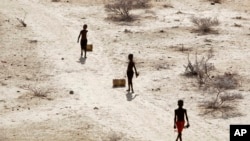Their warning is the latest in a series of statements from campaigners and experts warning that Africa is facing an unprecedented food crisis.
There is a death by starvation every 36 seconds on average in Ethiopia, Kenya and Somalia, the U.N.'s children's organization UNICEF and NGOs Care and Oxfam told a joint news conference in Paris.
Close to 20 million people in the Sahel region are living in food insecurity, they added.
In Burkina Faso, a country destabilized by a jihadist rebellion, three times as many children were killed between January and September 2022 as in the same period a year earlier. The number of minors treated for severe malnutrition rose by half, UNICEF said.
In Niger, recurring droughts and disastrous floods combined with ongoing conflicts led to a near-40% drop in cereal production as harvesting became increasingly difficult, said Louis-Nicolas Jandeaux at Oxfam France.
Some 430,000 children in Niger suffer from serious malnutrition, according to Lucile Grosjean, a spokeswoman for UNICEF.
This year, the number of malnourished pregnant or breastfeeding women is projected to rise to 154,000 from 64,000 in 2022, she added.
"Catastrophic situation"
In the Horn of Africa, five straight rainy seasons producing too little rain killed millions of cattle and destroyed harvests, according to the UN.
That put 22 million people at threat of starvation in Ethiopia, Kenya and Somalia with the latter— a country of 17 million — also in the throes of an islamist insurgency.
"We forecast that between April and June, more than a third of Somalia's population will be in a state of food crisis, with projections of a famine," said Mathilde Casper at Care.
Jandeaux, for Oxfam, argued that the food crisis was the result of an "injustice," accusing wealthy countries of "permanent inaction."
Last year, only about 62 percent of humanitarian financing needs were met, he said.
In an interview with French daily Le Monde, former World Food Program director David Beasley called on western governments to step up aid, saying Africa was facing the worst food and humanitarian crisis since World War II.
In a separate statement, also published Thursday, the Médecins Sans Frontières (Doctors Without Borders) NGO said an unprecedented number of undernourished children had been registered by its teams in the Maiduguri, in northeastern Nigeria.
"Last year was terrible, but this year could be worse if this trend continues," said Htet Aung Kyi, the organization's medical coordinator, warning of a "catastrophic situation" once food stocks from last year's harvests have been used up.







